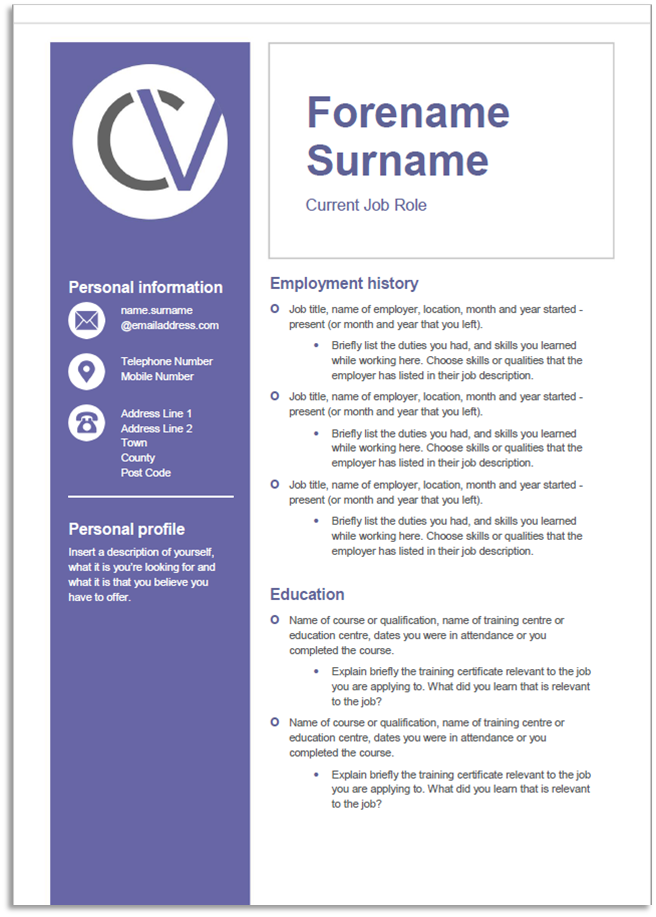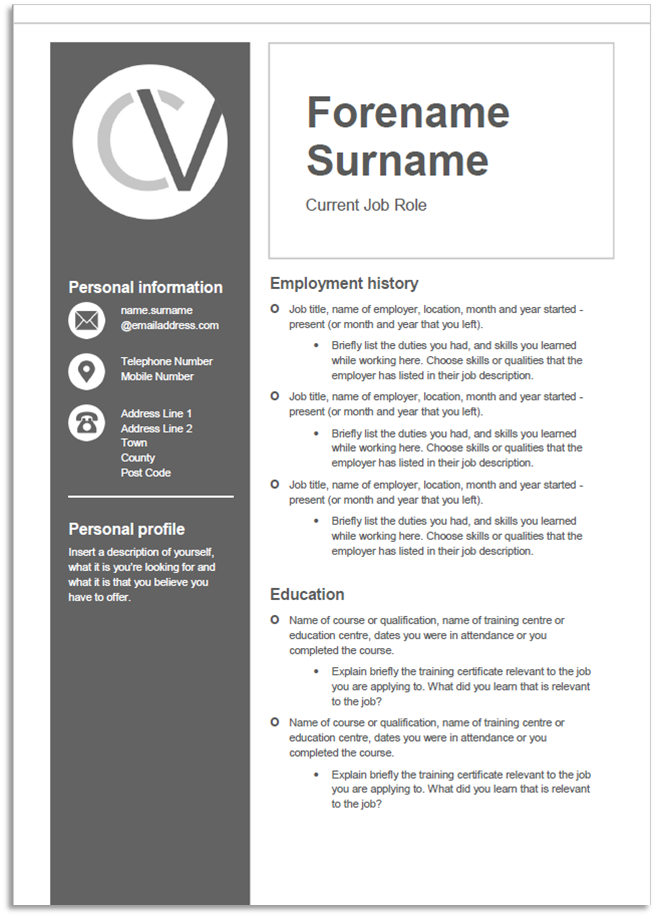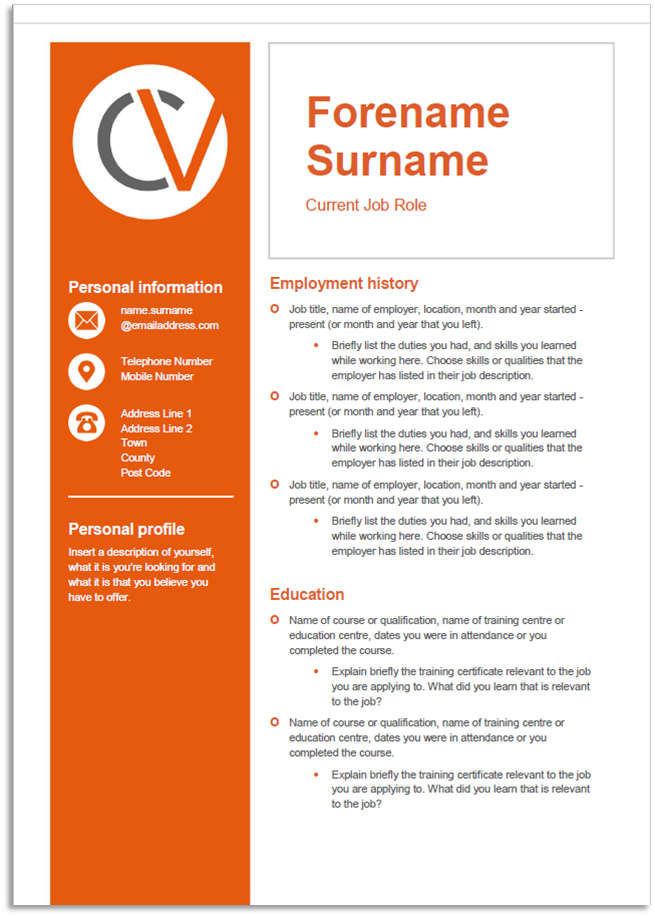If you’re self-motivated, organised and need flexible hours, then a job as a cleaner could be perfect for you.
To land a job as a cleaner, your CV will need to show that you can work independently and methodically and have a keen eye for detail. Any cleaning experience or qualifications, such as COSSH, will also look great on your CV.
Whether you're looking to start your cleaner career or looking for a new challenge, our free CV template is tailored to ensure your CV stands out from the crowd.
A guide to writing a CV for a job as a Cleaner
Millie Lee
0000 0000 00
MillieLee@email.com
Home Street
Home Town
Postcode
Personal Profile
In the personal profile, you should professionally introduce yourself, in three or four sentences, with relation to the job you’re applying to.
Try to include: your current work situation, what type of work you are searching for (such as part-time, flexible hours, or full-time employment starting immediately) some key skills, traits or experience that will show the potential employer that you are a good candidate for the advertised job. So if you have cleaning experience, a driving licence or are DBS cleared, mention this here.
EXAMPLE:
I am a hard-working and reliable individual with excellent attention to detail. I have three years of experience working as a cleaner, and I’m looking for a full-time role. I have a full, clean UK driving licence and DBS check.
Work History
The work history section shows the potential employer what jobs or work experience you’ve done. It is the first chance for you to highlight the skills and experience each job has given you, and this is turn should show why you are a good fit for the job you’re applying for. You don’t need to include every last detail, just pick the best parts. You can always write down and save your examples or other relevant skills for the interview.
- Job title, name of employer, location, month and year started – present (or month and year that you left)
- Briefly list the duties you had, and skills you learned while working here. Choose skills or qualities that the employer has listed in their job description
EXAMPLE:
- Cleaner, Nottingham High School, Nottingham, February 2017 – present
- Duties include vacuuming the floors, cleaning walls and windowsills, cleaning and restocking the bathrooms, weekly classroom cleans, stock takes and ordering products
What jobs should you include?
-
Try to include your work history for the last five years. If you have limited work experience, don't worry, it will be explained by the education history. If you have recently moved to the country, it’s okay to include employment in other countries. There is more advice on work and education history in our top CV tips online article.
- Any previous jobs you’ve has as a cleaner or other roles within the facilities management sector, will be useful to include here, as a lot of the skills will be relevant.
- If you have recently left education, or are new to this type of work, try to include any jobs you’ve had that will highlight the skills the employer is looking for. For example, if you have worked in hospitality, your job may have involved cleaning tables, bathrooms and customer areas, and ordering cleaning products, which are skills the employer will be looking for.
Education History
In education history, this is a chance to show any relevant training you have completed, what skills you have learned from your courses, as well as general education subjects you’ve passed. As you get more work experience, this section will become shorter, as your work history becomes more relevant and more recent
There are no set qualifications or education subjects needed for this type of work as you will receive training on the job. However any qualifications such as Health and Safety or COSHH (Control of Substances Hazardous to Health) would help your application.
- Name of course or qualification, name of training centre or education centre, dates you were in attendance or you complete the course
- Explain briefly the training certificate relevant to the job you are applying to. What did you learn that is relevant to the job?
EXAMPLE:
- First aid at work, British Red Cross Centre, Nottingham, August 2018
- Learned how and when to deal with specific illnesses in the workplace, and what do to if someone in injured while at work
Skills
Here is your chance to highlight the best skills you have in relation to the job you’re applying for. Hint: these will be the skills listed in the job advert, but only highlight the skills you have. Misleading information on your CV is likely to trip you up in an interview and is unprofessional; you don’t have to show you have every last skill listed in the job advert to be successful.
EXAMPLE:
- Knowledge of products and COSHH (Control of Substances Hazardous to Health) – ‘From my years of working as a cleaner I have a good understanding of correct uses for chemicals and products. I also have training in how to use them safely and what to do in a first aid situations.’
- Working in a team – ‘My job at Nottingham High School has improved my ability to collaborate with colleagues in my cleaning team, so we can work together and ensure all tasks are completed. I make sure we are communicating about tasks and any difficulties, and help each other out when needed.’
References
First and last name
Job title and relation to you in the work place (if it isn’t obvious from the job title), name of work place, work contact number (or main company phone number which they can be reached through) and work email address
EXAMPLE:
Kayleigh Shaw
Manager at Nottingham High School
0000 0000 00
janesmith@email.com
Who should you include as a reference?
- Your first reference should ideally be from your supervisor who you’ve been working closely with in your most recent role. The second reference can be from a current colleague, or line manager or supervisor from a previous job. It’s best practice to ask someone if they will be a reference for you before they are contacted. Be aware that not all employers actually contact references, but it’s important to have them available if needed
- It’s important to remember that while you are in your current job, consider that you may not want your reference (eg. your current boss) to be contacted until you have had an interview for a new possible job, or are actually offered it. This is because, for instance, if you weren’t offered the new job, and end up staying in your current job then you might not want your manager having been contacted as a reference. It can cause tension or awkward conversations about why you were trying to leave. A good way to get around this is to simply write ‘References available on request’. This shows the new employer that they can ask you for them as needed, but also means you can ask them to only contact them if you are offered the job, and then have time to ask the reference if it’s okay for them to be contacted. Most potential employers will be happy to wait to do this after offering you the job
- If you have only had one previous job, or have been studying, it is okay to include a tutor as a reference, or someone else as a character reference (who is not related to you)











